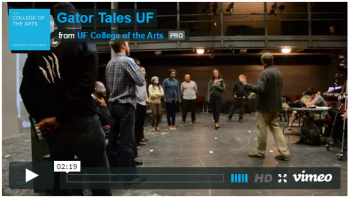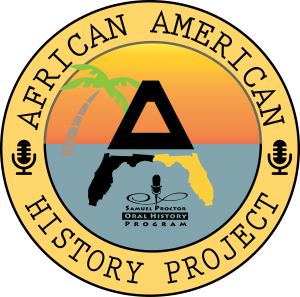 Research portals below link to existing oral history and media collections within the African American History Project, including educational guides and 300+ oral histories.
Research portals below link to existing oral history and media collections within the African American History Project, including educational guides and 300+ oral histories.
Oral History Interviews
The AAHP collection continues to grow as fieldwork expands across Florida, averaging 100 new born-digital interviews per year. These interviews feature notable figures, events and themes:
- Life under Jim Crow, including institution building, alternative educational techniques, food security, community-based healthcare, support and service organizations, displacement and dispossession, labor, and tactics of resistance;
- Two interviews with the last living survivor of the 1923 Rosewood Massacre;
- Civil Rights activism, including voter registration, the Tallahassee Bus Boycott movement, the 1964 St. Augustine movement, Congress of Racial Equality (CORE), Southern Christian Leadership Conference (SCLC), Southern Regional Council (SRC), NAACP, local movement organizations, the integration of public institutions, facilities, and higher education including SEC sports;
- Personal memories of luminaries such as Mary McLeod Bethune, Ralph Abernathy, Howard Thurman, and Harry T. Moore;
- Interviews with pastors and leaders of historic black churches throughout Florida;
- Black high schools and efforts to retain their legacies and alumni associations;
- Veterans of World War I, World War II, Korea, Vietnam, and the Gulf Wars;
- Gullah Geechee elders and Black Seminoles discussing coastal slavery, cultural traditions, and the legacies of the Seminole wars;
- African diaspora heritage from North America and the Caribbean;
Browse: Oral history interviews for the African American History Project are currently undergoing processing, and audio is available to access through the Samuel Proctor Oral History Program offices. A full document of 300+ oral histories in the AAHP archives at SPOHP is available on the AAHP digital listing.
Fifth Avenue Blacks Collection
Between 1982 and 1996, Mr. Joel Buchanan, a longtime employee of the George A. Smathers Library and UF alum, conducted some of the first interviews with African Americans in Gainesville for the Fifth Avenue African American (Alachua County) Oral History Collection, also known as Fifth Avenue Blacks (FAB). Interviewees were prominent members of Gainesville’s African American community, including:
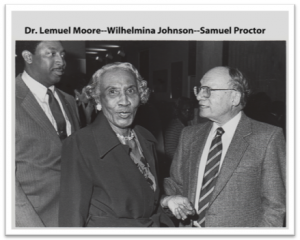 Dr. A. Quinn Jones, the longtime principal of Lincoln High;
Dr. A. Quinn Jones, the longtime principal of Lincoln High;- Frederica Jones, founding member of the Visionaires community organization;
- Reverend T.A. Wright, renowned local civil rights leader;
- Wilhelmina Johnson, activist for whom a community center was named in the Pleasant Street neighborhood;
- Andrew Mickle, revered educator and community elder;
- Rosa B. Williams, well-known for her activism and dedication to civil rights;
- Louise Perry Haile, who was a member of the highly-respected local Female Protective Society.
Browse: 51 of the 60 FAB transcripts are currently available on UFDC. Students with AAHP refer to these collections as the fundamental foundation of current oral history endeavors, and are grateful for Joel Buchanan’s efforts to preserve historical memory in the local Gainesville community and Alachua County.
Researchers, please note: FAB interviews were transcribed prior to the development of current standards in oral history. Some have undergone considerable editing and manipulation of the interview data. It is recommended that researchers refer to original interview audio as well as transcripts for the most correct historical information. Please contact SPOHP for details.
“Gator Tales” Archival Drama with UF College of the Arts, School of Theatre + Dance in Spring 2015
Gator Tales is a collaborative project between the Alachua County African American History Project (AAHP) and the UF School of Theatre and Dance. Gator Tales brings to life the unique experiences of African American students at the University of Florida from integration to the present based off of interviews from the AAHP collection.
Upon recommendation from the UF Center for the Humanities, Director Kevin Marshall sought African American history materials at SPOHP. This led him to meet Drs. Ortiz and Morini, who supplied him with materials regarding some of the most dramatic and memorable stories in the collection. As Marshall would later tell the Gainesville Sun, “These are stories about ordinary people who had extraordinary experiences during their lives, both at the University of Florida and in communities throughout North Central Florida.” (See article)
Many of the performances were followed by “talk-backs” that allowed the audience to talk to the cast, the director and representatives from SPOHP. The post show dialogues included questions about how the actors prepared to play the real and dynamic narrators, how and when these interviews were compiled and what are the obstacles that current African American students face at UF.
Gator Tales demonstrates SPOHP’s dedication to forging relationships with and giving back to local Gainesville communities, in addition to more traditional scholarly goals and outcomes. The response from the AAHP narrators featured in Gator Tales was enthusiastic. Many attended the performance, and in some cases relatives traveled from other parts of Florida. As featured interviewee Joseph McCloud commented to the Gainesville Sun: “This will be a chance for people to hear our stories who might not otherwise have a chance to hear them, and it is being performed during Black History Month… I hope current students at UF and young people from the community come out and learn some history.”
Gator Tales will be performed at a theater festival in Edinburgh, Scotland this summer, as well as in October at the annual meeting of the Oral History Association, which will be held in Tampa in 2015. SPOHP also produced video recordings of two performances, so that those who were unable to attend the play will still be able to see it. Gator Tales ran from February 13t to February 22. Performances during the last week of the production were completely sold out, and among those in attendance were UF students, professors, alumni, Gainesville community members, and several of the narrators featured in the play
The cast has a responsibility in this ‘archival drama’ of bringing to life people they’ve never met. This archival drama that is Gator Tales highlights their extraordinary life experiences.
–Director Kevin Marshall
The character’s stories are drawn from the AAHP archive, including interviews with Joel Buchanan, Ron Coleman, Bernard Hicks, Thomas Holland Fay, Joseph McCloud, Maime Lee Meath, Evelyn Moore Mickle, Stephan Mickle, Leitha Nichols, David Padgett, Laura Scott Reaves, Samuel Taylor, Gladys Thompson and Albert White.
- Watch “Gator Tales” today! The performance is available on YouTube.
- View SPOHP photos from the performance.
“Florida Voices: African American History In the Sunshine State To The Civil Rights Era” Volumes 1 & 2
“Florida Voices: African American History In the Sunshine State To The Civil Rights Era,” Volume 1 (2012) and Volume 2 (2014) are available as an introduction to AAHP. Each clip has been extracted to offer a concise series of narratives that are particularly interesting or poignant.
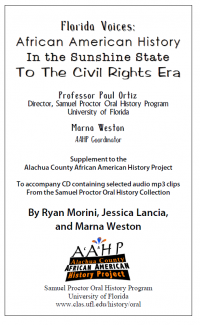 Florida Voices: Volume 1
Florida Voices: Volume 1
Read “Florida Voices: African American History In the Sunshine State To The Civil Rights Era,” Volume 1 (2012), now online with audio and interview information.
- “Racial Discrimination and Violence: Jim Crow and its Legacy in Florida” discusses clear instances of racial discrimination in various parts of north Florida. Some of these episodes take place before the Civil Rights Movement; others exemplify unspoken or de facto discrimination after the demise of the “separate but equal” doctrine.
- “Lincoln as a Metaphor for Community: The Integrating Role of Segregated Schooling,” examines the role of high schools in black communities under Jim Crow. Most of these clips discuss Lincoln High, the highly-respected black high school in Gainesville that was shut down during the move to integrate in 1970.
- “People in the Limelight of the University of Florida, and People in its Shadow,” showcases the role—or lack thereof—of UF in the affairs of the black community.
Florida Voices: Volume 2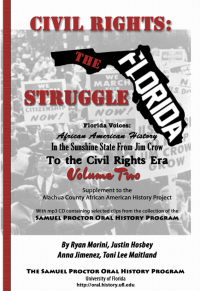
Read “Florida Voices: African American History In the Sunshine State To The Civil Rights Era,” Volume 2 (2014), now online with audio and interview information.
- “Education,” discusses the educational experiences of African American children from North Central Florida during the Jim Crow era. Narratives discuss the ways that children experienced racialization, and even racial violence from both white peers and adults.
- “Segregation of Public Facilities,” explores both de facto and de jure segregation, offering insight into the cultural politics of racial segregation in public spaces. The way African Americans were forced to navigate their bodies in both geographic and cultural spaces are articulated in several of the included interviews.
- “Resistance,” speaks to ways that African Americans fought back against racism, repelling racial indignities and invoking their rights as citizens to access public resources.
Highlight: RJE Panel Discussion, Students and Teachers Recollections
Robinson Jenkins Ellerson High School, or RJE as it is known to its graduates and teachers, was closed in 1969 in the era of desegregation. Years later, its alumni remember the powerful impact of their high school years in this important discussion of the school, the area of Starke, Florida, and the community that supported them all.
Participants are Yvonne Robinson, Deborah Sims, Valara Petteway, Ada Smith, Amandalene Chandler, Aretha Kearns, Glory Jackson, and Maurice White. Marna Weston interviews on September 2, 2011.
Browse: Watch the RJE panel on Youtube . Community organizing and local history workshops are available on SPOHP’s YouTube account.
Pleasant Street Historic Society Slide Presentation
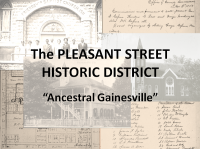 The Pleasant Street Historic Society, organized in 1984 by then-Gainesville resident Monica Smith, was founded to promote and preserve black history in Gainesville. The PSHS frequently works with SPOHP to document resources about black history in Gainesville and Alachua County, including the creation and update of the following Pleasant Street Historic Society presentation.
The Pleasant Street Historic Society, organized in 1984 by then-Gainesville resident Monica Smith, was founded to promote and preserve black history in Gainesville. The PSHS frequently works with SPOHP to document resources about black history in Gainesville and Alachua County, including the creation and update of the following Pleasant Street Historic Society presentation.
Browse: The “Pleasant Street Historic District: Ancestral Gainesville” presentation gathers contemporary and historic photographs of the neighborhood and its residents in a group effort to promote awareness of the neighborhood’s vibrant history in the public schools. Mount Pleasant United Methodist Church, Friendship Baptist Church, and Mount Carmel Baptist Church participated.
- Click image at right to view the presentation!
Family photographs and historical information were donated by Pleasant Street members as well as by Fifth Avenue community member Mamie Parks McClellan Williams, the historian of Mount Pleasant United Methodist Church. Donna Drake walked the neighborhood and took photographs of the historic houses. Drake and Williams revised the script of the presentation, and it is currently presented to community groups and children in Gainesville’s elementary schools by both Drake and Pleasant Street Historic Society member Mary Butler. Additional narrative is also available.
Drake and Williams recently worked with SPOHP to digitize the presentation with the help of volunteer Keilani Jacquot and AAHP staff Dr. Ryan Morini and Anna Brodrecht.
“Civil Rights in the Sunshine State” Museum Exhibit
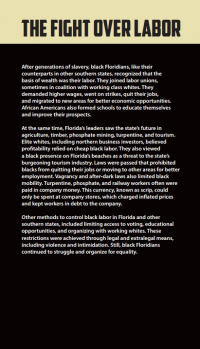
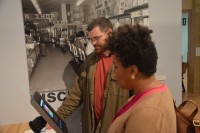 In 2015, the Museum of Florida History in Tallahassee presented “Civil Rights in the Sunshine State” to commemorate the 50th anniversary of the signing of the Civil Rights Act of 1964.
In 2015, the Museum of Florida History in Tallahassee presented “Civil Rights in the Sunshine State” to commemorate the 50th anniversary of the signing of the Civil Rights Act of 1964.
The exhibit explored the history of the Civil Rights Movement in Florida through artifacts, archival images, film footage and oral histories to educate visitors about Florida’s significant contributions to the Movement.
Browse: Exhibit text (PDF) is available for educators and the public to download and share. Photos forthcoming in Summer 2015.
- AAHP Coordinator Randi Gill-Sadler wrote a reflection on the exhibit and related panel, “A Tale of Three, Female Activists: Women in the Civil Rights Movement Panel at the Museum of Florida History.”
- View SPOHP photos from a field trip to the exhibit in February 2015!
For additional information, contact SPOHP, call the offices at (352) 392-7168, and connect with us online today.
